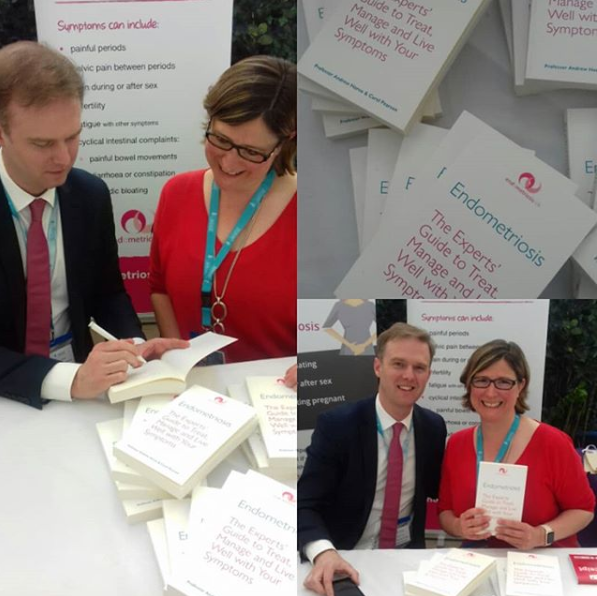This week is volunteers week – and all week we’ll be shining a spotlight on just some of our incredible volunteers. If you want to get involved, please tag us on Twitter @EndometriosisUK using the hashtag #volunteersweek and we'll be sharing your volunteer stories all week.
First up on the blog is Professor Andrew Horne – who we are delighted to announce has just joined Endometriosis UK as a Trustee. Andrew brings a wealth of experience and knowledge of endometriosis as an internationally renowned endometriosis expert and Professor of Gynaecology and Reproductive Sciences at the University of Edinburgh’s MRC Centre for Reproductive Health. He also co-authored “The Experts’ Guide to Treat, Manage and Live Well with Your Symptoms”, a book about treating, managing, and living with endometriosis, with Carol Pearson. You can order the book via amazon here
Devon-Clare Banfield, an intern with Endometriosis UK, caught up with Andrew during Volunteers Week to hear more about why he became a Trustee of Endometriosis UK.
Firstly, what drew you to become a trustee for Endometriosis UK?
I specialise in looking after women with endometriosis, and endometriosis research. As a trustee, I hope to be able to support Endometriosis UK to make real change: to raise awareness and improve understanding of endometriosis.
What do you do as an Endometriosis UK trustee?
As a trustee, I will help to set the strategic direction of the charity, the budget to deliver the strategy, and monitor progress to ensure the activities being undertaken are taking the organisation in the right direction. I officially started as a Trustee on last month so I am very new to the role!
How long have you been studying gynaecology?
I started my training in gynaecology in 1996 and I became a consultant in 2010, having taken time out to do research towards a PhD and work in Canada. Gynaecology was particularly appealing because it allows you to maintain an interest in both medicine and surgery. You can develop expertise in very sophisticated, technically challenging procedures if you choose, and make a real difference to women with problems, such as endometriosis. I think that it is a wonderful specialty, with something to offer almost everyone.
It takes 7.5 years to diagnose endometriosis on average, which is a long time. How do you believe this can be changed?
A lack of awareness among women and clinicians, as well as there being no conclusive non-invasive test, is causing much of the unacceptable delay between age at onset of symptoms and age at diagnosis. To see real progress in endometriosis test development, we need significant financial investment into endometriosis research. Endometriosis UK is in a unique position to make endometriosis visible and to influence politicians and the government so that they will provide the support required.
Do a lot of your students know what endometriosis is before they get to you? Do you focus a lot on endometriosis in your curriculum as a professor?
I think endometriosis is still poorly taught in the undergraduate curriculum but this is changing, particularly due to the work by Endometriosis UK to raise awareness. Naturally, I am keen to teach students about endometriosis and pelvic pain.
Finally, you co-authored the book “The Experts’ Guide to Treat, Manage and Live Well with Your Symptoms” that was released last year. What inspired you to write a book about endometriosis?
My co-author Carol Pearson and I wanted to write a book that provided accessible and evidence-based information for people with endometriosis. There is so much information available now on the internet and in the press that I think it can often be difficult to work out what is factually correct. We also wanted to hear from people who suffered from the condition, as well as experts in the management of endometriosis, so Carol spent many hours interviewing women, their partners, doctors and allied healthcare practitioners to inform the content of the book. I hope that the end result reflects all of this hard work and our commitment to making life easier for endometriosis sufferers.
To hear more about Andrew's story, check out his interview which was shown as part of the "Beyond the Invisible" exhibition by Standard Life, featuring photos from internationally-renowned photographer Rankin. You can watch the interview here







